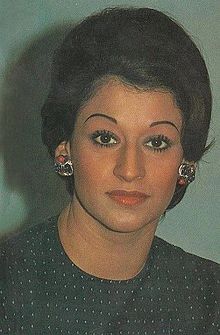Warda Al-Jazairia
Warda Al-Jazairia وردة الجزائرية | |
|---|---|
 Warda Al-Jazairia, 1977 | |
| Background information | |
| Birth name | Warda Fatouki[1] |
| Born | 22 July 1939 Puteaux, France |
| Died | 17 May 2012 (aged 72) Cairo, Egypt |
| Genres | Egyptian music, Arabic pop music |
| Occupation | Singer |
| Years active | 1951–1962; 1972–2012 |
| Labels | EMI Arabia Virgin/EMI Records |
Warda Al-Jazairia (Template:Lang-ar 22 July 1939 – 17 May 2012) was an Algerian singer who was well known for her Egyptian Arabic songs and music. Her name literally meant Warda the Algerian, but she was commonly referred to as just Warda (Egyptian Arabic: [ˈwæɾdæ]) or as "The Algerian Rose" in the Arab world.
Biography
Warda Fatouki was born in 1939 in Puteaux, France, to a Lebanese mother and an Algerian father. She started singing at the age of eleven in 1951. She quickly became well known for her singing of patriotic Arabic songs. In 1972, Algerian president Houari Boumediène asked her to sing to commemorate Algeria's independence, and she performed with an Egyptian orchestra.[citation needed]
She then moved to Egypt, where she made her fame and married the popular Egyptian composer Baligh Hamdi. She performed many of his songs and those of other Egyptian composers, quickly rising to fame and releasing several albums per year. Additionally, she starred in a few Egyptian movies, starring with big movie stars as Roushdy Abaza. She was granted the Egyptian nationality and sang popular nationalist songs for the country as Helwa Belady El Samra.[citation needed]
The Egyptian song "My Great Homeland" ("Al Watan Al Akbar"), was performed by the biggest stars in Egyptian music industry at that time including Abdel Halim Hafez, Shadia, Sabah, Najat Al Saghira[2] and Faiza Kamel. The song denounced colonialism and urged for a united Arab nations to defeat foreign occupation (see Partitioning of the Ottoman Empire).
Death
Warda died on 17 May 2012 in Cairo, after suffering a cardiac arrest. She was 72 years old.[3]
On 19 May, her body was flown back to Algeria, her homeland, where she was given a state funeral, and was buried in Algiers' El Alia Cemetery, which is reserved for national heroes.[4][5]
References
- ^ Archived 18 May 2012 at the Wayback Machine
- ^ "Who is Najat Al Saghira?", najatalsaghira.wordpress.com; accessed 28 August 2015.
- ^ "Veteran Algerian singer Warda dies in Cairo at the age of 72". alarabiya. 17 May 2012. Retrieved 29 August 2012.
- ^ "L'Algérie dit adieu à Warda sa diva enterrée comme une figure de l'Etat". RFI. 20 May 2012. Retrieved 21 May 2012.
- ^ "Algeria tribute to Arab singing legend Warda". AFP. Retrieved 20 May 2012.
External links
- WardaOnline.com, official site
- Warda discography and music
- musicmoz.org page
- Warda at AllMusic
- Warda el Jazairia at IMDb
